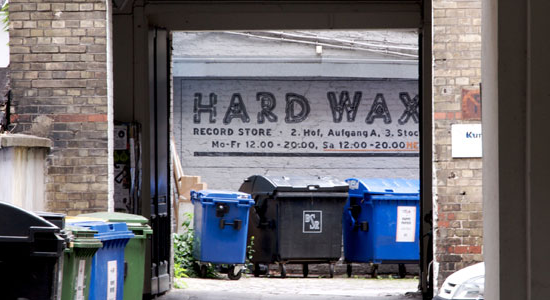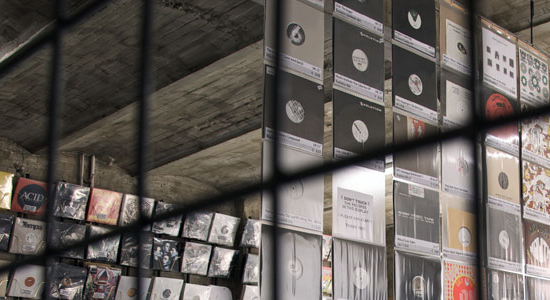
Senza ombra di dubbio il negozio numero uno di Berlino (a detta di molti addetti addirittura il numero uno al mondo), Hard Wax è diventato con gli anni un luogo di culto per gli amanti dell’underground music grazie sopratutto alla continua ricerca qualitativa, assolutamente il punto di forza di questo vinyl shop. Se la pensano così gente come Jeff Mills, Derrick May, Ricardo Villalobos e Margaret Dygas (solo alcuni dei tanti nomi che sono entrati assiduamente nel negozio), ci sarà sicuramente un motivo!
Noi di Soundwall abbiamo scambiato due chiacchere a proposito di Berlino, del negozio e della scena musicale della città con Michael, uno dei “guys” di Hard Wax… in fondo all’intervista troverete una piccola sorpresa:
Quali sono le principali differenze tra Berlino e le altre capitali europee?
Storicamente, Berlino è stata divisa in due parti per 28 anni. Gran parte della dinamicità oggi deriva da quella formale distinzione che c’è stata. Credo che la principale differenza sia il “cheap way of living” (stile di vita economico), non esiste altra città dove sia così facile avere una vita creativa.
Quanto ha influenzato la nightlife l’aspetto liberale della città?
Definitivamente molto! C’è qualcosa di speciale nell’andare in un club letteralmente ad ogni ora della settimana e trovare quell’atmosfera che solitamente uno si aspetta solo il sabato notte. Le autorità sono abituate ad avere a che fare con la scena dei club e con i progetti “innovativi” e ad essere permissive, dunque la gente è più portata a creare situazioni inusuali.
Qual’è l’idea originale del progetto Hard Wax? Qual’è la sua particolarità? perchè è così importante?
Non so dire se ci fosse una particolare idea dietro il progetto. Originariamente, nel 1989, Mark Ernestus aprì il negozio semplicemente perchè non c’era altro posto dove trovare musica interessante che provenisse dagli States. Il nostro punto di forza è di offrire una selezione essenziale di dischi nuovi e classici nei nostri campi di competenza. Tradizionalmente abbiamo buone relazioni con label e artisti negli U.S.A. e un nostro approccio verso la musica nuova. Una prima selezione della musica che offriamo diventa sempre più importante più la musica diventa accessibile, un servizio che offre una guida ai nostri clienti nel diluvio di releases, è la competenza fondamentale che deve avere un record dealer! Noi cerchiamo di mantenere questo sia in negozio che sul sito, seguendo alla lettera la frase “meno è meglio”.
Chi sono i vostri clienti e visitatori abituali?
I nostri clienti regolari sono DJ, produttori, collezionisti, sia di Berlino che da qualsiasi parte del mondo. Servivamo un ragazzo famoso come Ricardo quando a 15 anni si faceva ancora pagare i dischi da suo padre. Con il negozio via web è la stessa cosa, abbiamo clienti da ovunque e con qualsiasi gusto musicale. Personalmente mi piace il fatto che la gente di Hard Wax compra molti dischi cool di vario genere: dalla nuova Dubstep, la Techno Berlinese, le ristampe House e i classici Reggae.
Berlino è la nuova capitale della techno come lo fu Detroit?
Non so davvero se la techno abbia bisogno di una capitale (sicuramente ce ne sono state), ma Berlino è definitivamente uno dei punti di forza del nuovo Techno-global-network.
Quali sono i nuovi trends in città?
La musica interessante non ha bisogno di trends. Quello che sento è che molta buona musica emerge dalla Techno Berlinese e dalla Dubstep, sta accadendo qualcosa di innovativo in questi generi.
Io credo che i club dovranno essere più aperti a generi che non siano house o techno, e mixare diversi stili, come il “Wax Treatment” un party che noi di Hard Wax proponiamo una volta al mese al “Horst Kreuzberg”.
Quale sarà il futuro della nightlife Berlinese?
Molta professionalità sta entrando nella scena club, oltretutto le autorità iniziano a valorizzare la scena club come una risorsa per le casse della città. Ci sono ancora molte zone e aree da scoprire e nuovi clubs nascono ogni mese, diciamo che puoi trovare i “primi anni ’90” a Berlino.
Quali sono per te i club che hanno influenzato la città? I migliori?
Lo so, è noioso da dire, ma sicuramente il Berghain. E’ il centro mondiale del clubbing, non solo per Berlino! Ci sono però molti altri club in Friedrichschain. Durante l’estate poi, aprono numerosi locali e terrazze sullo Spree come il Club der Visionäre. Hanno un fortissimo impatto sul feeling generale della città, è tutto molto rilassato.
Quali sono stati i primi locali a Berlino? quali i più importanti?
Molti dei primi locali non esistono più: E-Werk, Frisör, Cartier, Elektrokohle, Bunker. Il Tresor è l’unico dei locali che esiste fin dall’inizio, anche se ha cambiato location.
Quali sono i migliori dj in circolazione a Berlino?
Scusate, ma non posso fare un ranking come questo. Uno di quelli che hanno avuto più successo è sicuramente Ricardo Villalobos, ma molti ottimi musicisti si sono mossi verso Berlino e dunque è difficile da dire. Personalmente mi piacciono i resident del Berghain/Panoramabar DJ che sono amici o colleghi di Hard Wax come: Prosumer, Shed, Marcell Dettmann, DJ Pete, Tama Sumo.
Ti va di proporci un po’ di dischi?
Jam City: Ecstacy Refix / Night Slugs WL 004
Eliphino: Let Me Love You Forever / Brownswood Recordings 056
Ramadanman: Fall Short / Swamp 81 006
Candi Staton: Do Your Duty (Pépé Bradock Mixes) / Honest Jon’s HJP 014
Doc Daneeka: Mario’s Mushrooms / Ramp Recordings PTN 005
Wax: Dub Shed Sessions 1 / Subsolo 005
Emika: Double Edge / Ninja Tune Zen 262
DJ Naughty: Goosebumps (Gemmy Remix) / Kicks and Snares MR 009
Shed “Boom Room” and Soundstream “Wenn Meine Mutti Wüsste”
English Version :

Which is the main differences between Berlin and the other European capitals?
Historically, Berlin was devided into two parts for 28 years. A lot of the city’s dynamic still evolves from that former division. One main difference is the cheap way of living. There is no other city in which it is so easy to live a creative’s life.
How much has the “liberal” aspect of the city influenced the nightlife?
Definetely a lot. It is something special to be able to go into a club at literally any hour of the week and find an atmosphere that one usually expects from Saturday nights only. The authorities are used to deal with the club scene and innovative projects and therefore are perhaps more likely to make unusual things possible.
Which is the original idea of the project Hard Wax? Which is its particularity? Why it is so important?
I don’t know, if there is one particular idea behind it. Originally – back in 1989 – Mark Ernestus started the shop because there simply wasn’t any other carrying the interesting music from the states. Our goal is it to offer an essential selection of new and classic music in our fields of expertise. Traditionally we have good relations to labels and artists in the U.S. and a certain approach towards new music. The selection and restriction of the music we offer becomes more important as more music is accessible. To guide our costumers through the flood of releases and point him to the treasures is the core competence of a recorddealer. We try to maintain this both in our store and on our website. We really value the sentence “less is more”.
Who are the usually visitors/customers of your shop?
Our regulars are DJs, producers, music collectors, Berliners and visitors from almost everywhere in the world. We serve famous guys like Ricardo as the 15-years old boy who’s grand dad pays for the vinyl. With the webshop it is the same. We have costumers everywhere and of all kind of musical preferences.
I really like the fact, that people at Hard Wax often buy cool records of various styles: new Dubstep, dry Techno from Berlin, House re-issues and Reggae classics.
Is it Berlin the new capital of techno music like Detroit was?
I really don’t know if Techno needs a capital (although there surely are anthems), but Berlin is definetly one of the thick knots in the global Techno-network.
Which are the new trends for the sound in the city?
Interesting music doesn’t really care about trends. What I feel is, that a lot of good music emerges from the clash of Berlin’s Techno culture and the Dubstep scene. Innovation is somehow built-in here.
I think, clubs will be more open to other genres than house and techno and mix styles – like the Wax Treatment-parties hosted monthly at Horst Kreuzberg by Hard Wax.
Which will be the future of the Berliner nightlife?
A lot of professionalism has entered the club scene. Authorities start to value the clubs and nightlife as an asset for Berlin. Still there are places and areas to be discovered and new clubs emerge every month. You still can find the “early 90ies” in Berlin.
Which are for you the clubs that have more influence on the city? The best?
I know, it is boring to say, but that would be Berghain. It is the central clock of clubbing not only in Berlin. But there are a lot of clubs e.g. in Friedrichshain.
During summer outdoor-areas by the river Spree like Club der Visonäre open again. These have a massive impact on the general feeling in the city – it is very relaxed.
Which were the first clubs in Berlin? Which are the most important?
Most of the first clubs do not exist anymore: E-Werk, Frisör, Cartier, Elektrokohle, Bunker.
Tresor is almost the only club from the early years still existing, although in a new location.
Wich are the best Berliner dj?
Sorry, but I can’t make a ranking like this.
One of the most successful is certainly Ricardo Villalobos. But since a lot of great musicians move to Berlin, it is hard to tell.
Personally I like most Berghain/Panoramabar resident DJs who are often friends and colleagues at Hard Wax: Prosumer, Shed, Marcel Dettmann, DJ Pete, Tama Sumo.
Can You give us a selection?
Jam City: Ecstacy Refix / Night Slugs WL 004
Eliphino: Let Me Love You Forever / Brownswood Recordings 056
Ramadanman: Fall Short / Swamp 81 006
Candi Staton: Do Your Duty (Pépé Bradock Mixes) / Honest Jon’s HJP 014
Doc Daneeka: Mario’s Mushrooms / Ramp Recordings PTN 005
Wax: Dub Shed Sessions 1 / Subsolo 005
Emika: Double Edge / Ninja Tune Zen 262
DJ Naughty: Goosebumps (Gemmy Remix) / Kicks and Snares MR 009
check: Shed “Boom Room” and Soundstream “Wenn Meine Mutti Wüsste”


